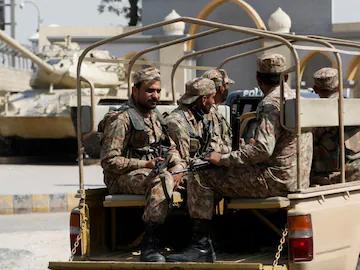 |
|
The tragic events unfolding in Pakistan's Khyber Pakhtunkhwa province serve as a stark reminder of the ongoing challenges facing the nation in its fight against violence and extremism. The brutal attack, which resulted in the deaths of at least 38 innocent civilians, including a woman and a child, underscores the urgent need for comprehensive strategies to combat terrorism and ensure the safety and security of its citizens. The sheer scale of the massacre, with 29 others sustaining injuries, points to a meticulously planned and executed act of violence designed to inflict maximum harm and sow fear among the population. The indiscriminate targeting of passenger vehicles highlights the callous disregard for human life demonstrated by the perpetrators.
The immediate aftermath of the attack was undoubtedly chaotic and harrowing. Emergency services were likely overwhelmed by the sheer number of casualties, requiring a coordinated effort from various agencies to transport the injured to hospitals and provide necessary medical attention. The grim task of identifying victims and notifying their families would have been particularly challenging and emotionally taxing for emergency responders. Meanwhile, security forces would have been deployed to secure the crime scene, investigate the incident, and launch a search for the perpetrators. The investigation itself presents a significant challenge, as gathering evidence and piecing together the events will require extensive forensic analysis and witness testimonies. This investigative process must be thorough and impartial, to ensure accountability for those responsible and to prevent similar tragedies in the future.
The international community has a crucial role to play in assisting Pakistan in its fight against terrorism. This includes providing intelligence sharing, training, and technical assistance to improve counter-terrorism capabilities. Furthermore, international pressure on terrorist organizations operating within Pakistan's borders is crucial. However, effective counter-terrorism strategies must also address the underlying social and economic factors that contribute to the rise of extremism. Poverty, inequality, and a lack of opportunities can create a breeding ground for radical ideologies. Investing in education, economic development, and social programs is therefore essential to undermine the appeal of extremist groups and promote peaceful coexistence within the country. International collaborations focused on sustainable development and inclusive governance could significantly contribute to long-term stability and security in Pakistan.
The statement by President Asif Ali Zardari condemning the attack as a 'cowardly and inhumane act' underscores the gravity of the situation and the widespread condemnation of the violence. However, strong words alone are insufficient. Concrete action is required to address the root causes of extremism and enhance security measures. This necessitates a multi-pronged approach encompassing military interventions to neutralize terrorist networks, as well as extensive investment in bolstering intelligence gathering capabilities and strengthening law enforcement agencies' capacity to investigate and prosecute those responsible for such crimes. The focus must shift from mere reactive measures to proactive strategies, including community engagement and deradicalization programs. Addressing the grievances of marginalized communities and fostering a sense of inclusivity are crucial aspects in curtailing the appeal of extremist ideologies.
Moving forward, the Pakistani government faces the difficult task of balancing the need for security with the protection of civil liberties. Any measures taken to combat terrorism must adhere to the principles of human rights and due process. There is a risk that in the aftermath of such atrocities, the temptation to resort to heavy-handed tactics may arise. However, a balance must be struck to ensure that the fight against terror doesn't compromise the fundamental rights of citizens. This delicate balancing act requires careful consideration of potential collateral damage and a commitment to upholding the rule of law, even in the face of adversity. The international community must provide support and oversight to ensure that Pakistan's response is both effective and respectful of human rights standards. Ultimately, lasting peace and security can only be achieved through a combination of effective security measures, inclusive governance, and sustainable development.
The attack in Khyber Pakhtunkhwa serves as a tragic illustration of the challenges that Pakistan continues to face. The scale of the violence highlights the need for a comprehensive, multi-faceted approach that addresses both the immediate security concerns and the long-term social and economic factors that contribute to extremism. The international community must stand in solidarity with Pakistan in its efforts to combat terrorism, while urging a measured response that prioritizes human rights and the rule of law. Only through a concerted and collaborative effort can a lasting solution to this persistent threat be found, safeguarding the lives and well-being of the Pakistani people.
